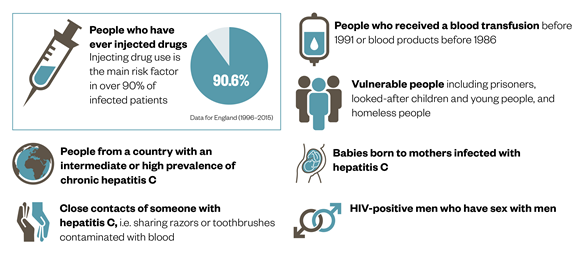Hepatitis C Treatment in Romania
Search and Compare the Best Clinics and Doctors at the Lowest Prices for Hepatitis C Treatment in Romania

Find the best clinics for Hepatitis C Treatment in Romania
No clinics available
Turkey offers the best prices Worldwide
Price: $ 22,731

- Home
- Romania
WHY US?
At Medijump, we're making medical easy. You can search, compare, discuss, and book your medical all in one place. We open the door to the best medical providers worldwide, saving you time and energy along the way, and it's all for FREE, no hidden fees, and no price markups guaranteed. So what are you waiting for?

Free

Best Price

Widest Selection

Risk-Free
What you need to know about Hepatitis C Treatment in Romania

Hepatitis C is a viral infection that can cause liver inflammation and lead to serious liver damage. If you have hepatitis C, your doctor will examine your specific condition and make a treatment plan based on the type of the hepatitis C (genotypes), your general condition, and how much liver scarring (cirrhosis) you have.
What does a Hepatitis C Treatment Procedure Involve?
The main treatment options for hepatitis C are antiviral medication and liver transplantation. Antiviral medication is used to clear the virus from your body in at least 8 to 12 weeks. If you have developed a more serious complication, then liver transplantation can be an option. During liver transplantation, you are given a general anesthetic, and then your doctor removes the damaged liver and replaces it with a healthy liver, either from a deceased donor or a living donor.
How Long Should I Stay in Romania for a Hepatitis C Treatment Procedure?
If your doctor gives you antiviral medication, you may need to stay in Romania for a few weeks as your doctor needs to monitor how your body is responding to the medication. If you undergo surgery, you are required to spend 5 to 10 days in the hospital and stay in the country for 10 to 14 more days after you are discharged from the hospital.
What's the Recovery Time for Hepatitis C Treatment Procedures in Romania?
The recovery time depends on which treatment you underwent. With antiviral medication, you should be able to get back to most of your normal routine within a couple of days or as soon as you do not experience any symptoms or side effects from the medication. With a liver transplant, the full recovery period can take around six months, but you should be able to return to work within 12 weeks.
What sort of Aftercare is Required for Hepatitis C Treatment Procedures in Romania?
Making healthy lifestyle changes is very important after your treatment, such as following a healthy and balanced diet plan and regular exercise. Treatment with antiviral medication requires regular follow-up checkups to monitor your condition and progress. With liver transplantation, you also need regular checkup and you may need to take medication for a longer period of time.
What's the Success Rate of Hepatitis C Treatment Procedures in Romania?
Antiviral medicine is a safe and effective treatment for hepatitis C, with around 90% of patients with the condition are cured. Liver transplant is generally safe and approximately 70% of patients who undergo the procedure can live for ten years or longer. Both have some side effects and risks, such as depression, anxiety, skin irritation, insomnia, anorexia, tiredness, hair loss, aggressive behavior, bile duct complications, blood clots, bleeding, failure or rejection of donated liver, infection, mental confusion, and seizures
Are there Alternatives to Hepatitis C Treatment Procedures in Romania?
You will need antiviral medication to treat hepatitis C, but if the infection is diagnosed in the early stages, you may not need treatment immediately. However, you still need to make lifestyle adjustments. Your doctor will have several blood tests to see if your body fights off the virus, if the infection does not continue, you usually do not need treatment.
What Should You Expect Before and After the Procedure
When you have hepatitis C, the virus can damage your liver and you may experience symptoms, such as fatigue, bruising easily, bleeding easily, jaundice, weight loss, dark-colored urine, and more. After treatment, you may be cured and will not experience any of these symptoms anymore.
Whilst the information presented here has been accurately sourced and verified by a medical professional for its accuracy, it is still advised to consult with your doctor before pursuing a medical treatment at one of the listed medical providers
No Time?
Tell us what you're looking for and we'll reachout to the top clinics all at once
Enquire Now

Popular Procedures in Romania
Prices Start From $50

Prices Start From $35,013

Prices Start From $39

Recommended Medical Centers in Romania for procedures similar to Hepatitis C Treatment

- Interpreter services
- Translation service
- Religious facilities
- Medical records transfer
- Medical travel insurance
- Health insurance coordination
- TV in the room
- Safe in the room
- Phone in the room
- Private rooms for patients available

- Interpreter services
- Translation service
- Religious facilities
- Medical records transfer
- Medical travel insurance
- Health insurance coordination
- TV in the room
- Safe in the room
- Phone in the room
- Private rooms for patients available

- Interpreter services
- Translation service
- Religious facilities
- Medical records transfer
- Medical travel insurance
- Health insurance coordination
- TV in the room
- Safe in the room
- Phone in the room
- Private rooms for patients available

- Interpreter services
- Translation service
- Religious facilities
- Medical records transfer
- Medical travel insurance
- Health insurance coordination
- TV in the room
- Safe in the room
- Phone in the room
- Private rooms for patients available

- Interpreter services
- Translation service
- Religious facilities
- Medical records transfer
- Medical travel insurance
- Health insurance coordination
- TV in the room
- Safe in the room
- Phone in the room
- Private rooms for patients available

- Interpreter services
- Translation service
- Religious facilities
- Medical records transfer
- Medical travel insurance
- Health insurance coordination
- TV in the room
- Safe in the room
- Phone in the room
- Private rooms for patients available

- Interpreter services
- Translation service
- Religious facilities
- Medical records transfer
- Medical travel insurance
- Health insurance coordination
- TV in the room
- Safe in the room
- Phone in the room
- Private rooms for patients available

- Interpreter services
- Translation service
- Religious facilities
- Medical records transfer
- Medical travel insurance
- Health insurance coordination
- TV in the room
- Safe in the room
- Phone in the room
- Private rooms for patients available

- Interpreter services
- Translation service
- Religious facilities
- Medical records transfer
- Medical travel insurance
- Health insurance coordination
- TV in the room
- Safe in the room
- Phone in the room
- Private rooms for patients available

- Interpreter services
- Translation service
- Religious facilities
- Medical records transfer
- Medical travel insurance
- Health insurance coordination
- TV in the room
- Safe in the room
- Phone in the room
- Private rooms for patients available
Hepatitis C Treatment in and around Romania
Introduction
Situated at the crossroads of Central, Eastern, and Southeastern Europe, Romania is a country of contrasts. From its medieval towns and castles, nature, and wildlife, to its rich cultural heritage and amazing food, this country continues to amaze its visitors. In recent years, Romania has become a flourishing medical tourism destination. Due to its low prices, well-trained medical staff, highly skilled doctors, and amazing medical centers, the country attracts an ever-increasing number of international medical tourists. Dental work is the number one reason medical tourists travel to this country, closely followed by cosmetic surgeries. Most medical tourists come from other European countries, such as the UK, Germany, other Western European countries, and the US.
Popular Cities and Regions in Romania
Almost every city in Romania has its fair share of amazing tourist attractions and skilled specialists. The most popular one is the capital of the country, Bucharest. This dynamic city boasts excellent museums, trendy cafes, and beautiful parks. Tourists usually flock to the Palace of Parliament, the Statue of Emperor Trajan, Cişmigiu Garden, the Romanian Athenaeum, and the Museum of the Romanian Peasant. Besides Bucharest, one of the most popular cities in the country is Brasov which is located in Transylvania; tourists usually come to this city as their base for trips to “Dracula’s castle.” The city is filled with charming medieval streets, great hiking spots, and a beautiful historic center. The second-largest city in Romania, Cluj-Napoca, is also famous for its bohemian cafes, amazing medical centers, and music festivals.
Transport in Romania
Henri Coandă International Airport is the busiest airport in Romania. It serves flights to various major cities in Europe, Africa, and the Middle East. Getting around Romania with domestic flights is fast, but can be expensive. The most common way to travel is by bus and maxi taxi (minibus), which reaches even the smallest towns.
Visas in Romania
While Romania is not yet part of the Schengen Area, the country’s visa policy is based on the Schengen acquis. Therefore, citizens of 62 countries, including the US and Australia, can visit and stay in the country for up to 90 days without a visa. Citizens of other countries will need a visa to enter. Those who already have a Schengen visa may enter the country.
Weather in Romania
Spring from March to May has fairly mild temperatures and pleasant weather. Summer, starting from June to August, is usually dry, sunny and sweltering. Autumn comes in September and ends in November. It brings enjoyable temperatures, but it is also the rainy season in the country. Winter, from December to February, can get quite cold and harsh with frequent snowfall.
Additional Info
- Local Currency: The currency is the Romanian leu (RON). 1 USD is approx. 4.7 RON.
- Money & Payments: ATMs can be found in major cities and smaller towns. Credit cards are widely accepted in restaurants and hotels. Tipping is expected in restaurants, hotels, etc.
- Local Language: There are several spoken languages in Romania. However, Romanian is the most spoken language. English is also spoken by around 31% of the population.
- Local Culture and Religion: Romania is a secular state with no state religion. However, Christianity is the biggest religion. Islam, Paganism, and other religions are also present.
- Public Holidays: New Year’s Day, Descent of the Holy Spirit, National Day, and Christmas Day are some of the most celebrated public holidays.
Popular Searches
- Plastic Surgery in Thailand
- Dental Implants in Thailand
- Hair Transplant in Thailand
- Breast Augmentation Thailand
- Gastric Sleeve in Thailand
- Gender Reassignment Surgery in Thailand
- Laser Hair Removal in Bangkok
- Botox in Bangkok
- Dermatology in Bangkok
- Breast Augmentation in Bangkok
- Coolsculpting in Bangkok
- Veneers in Turkey
- Hair Transplant in Turkey
- Rhinoplasty in Turkey
- Stem Cell Therapy in Mexico
- Rhinoplasty in Mexico
- Liposuction in Mexico
- Coolsculpting in Tijuana
- Rhinoplasty in Korea
- Scar Removal in Korea
- Gastric Sleeve in Turkey
- Bone Marrow Transplant in India
- Invisalign in Malaysia
- Plastic Surgery in the Dominican Republic
- Tummy Tuck in the Dominican Republic
- Plastic and Cosmetic Surgery in Poland
- Rhinoplasty in Poland
- Hair Implant in Poland
- Dental Implants in Poland
- IVF in Turkey